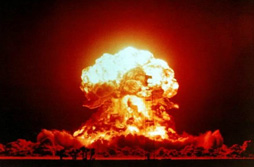 영어토론방 영어토론방 | Home>영어토론방 |
Politics Nuclear-Free World
페이지 정보

본문
 Nuclear-Free World
Nuclear-Free World The message to North Korea contained in the new U.S. nuclear strategy seems quite simple: Keep your nuclear arms and remain a target. It says, in other words, Pyongyang’s nuclear weapons development program under the pretext of the U.S. nuclear threat will not enhance North Korea’s national security but sharply weaken it instead.
We are quite skeptical, however, whether the reclusive regime will change its attitude much in response to the new Nuclear Posture Review, which effectively narrowed the targets of possible U.S. nuclear retaliation from about seven countries to two with the other being Iran.
In a worst case scenario, it would end up providing more excuses for the North’s hardliners to even step up nuclear armament, saying Washington has violated the September 2007 agreement, which affirmed that ``the U.S. has no intention of attacking or invading North Korea with nuclear or conventional weapons.” This is a serious loophole in the otherwise commendable efforts, especially if the most urgent issue is the prevention of weapons transfer to dangerous groups.
Of course, the dilemma facing U.S. President Barack Obama caused by the gap between his ideals of the world without nuclear arms and reality is understandable. It is also inevitable for someone eclectic like the current U.S. leader to be accused by extremists at both ends.
Still as far as North Korea’s nuclear issue is concerned, many Koreans are finding it hard to deem that the Obama administration has done its best. More frankly, Washington gives the impression of trying to just muddle through under the vague diplomatic wrapping of ``strategic patience.”
If the U.S. intends to tacitly overlook Pyongyang’s possession of a dozen atomic bombs and instead focus on preventing their proliferation or transfer to other rogue states or terrorist groups, its present strategy may be useful, although its repercussions would be enormous for South Korea and Japan, forced to directly face a nuclear-armed neighbor. Provided, however, Washington’s policy goal is still to denuclearize the North, nothing would be more dangerous than resorting only to increased pressure without active involvement.
As seen by global interests in Kim Jong-il’s scheduled visit to China, Washington has virtually outsourced the solution of this problem to Beijing, making it the single most influential party in the regional power balance.
Because the Chinese leadership’s perception about what kind of state North Korea should eventually be will sharply differ from those of the U.S. and its Western allies, the ongoing strategy and attitude of Washington will likely drive itself into a no-win situation. All this means that the United States should hasten to solve the North Korean issue while it has common interests with China in blocking Pyongyang’s nuclearization.
President Obama, who has just turned a major corner at home with the Congressional passage of health care reform, will focus on his biggest global agenda of nonproliferation until May. At issue is whether he will be able to attain any ``visible” results. As we have numerously repeated, North Korea may be the easiest player to produce progress if Obama so decides. The U.S. should move _ the sooner, the better.
Excerpt from: The Korea Times
http://www.koreatimes.co.kr/koreatime_admin/LT/common/nview.asp?idx=1022&nmode=2
Question
1. Have you ever thought about the problems of North Korea’s nuclear?
Do you know about the current issues about nuclear weapons?
2. What should the U.S. president have to do in this situation?
What do you think about his position and role?
3. What can be problems between North and South Korea?
What can be solutions to ease the strained relations between them?
이 글은「대학연합영어토론동아리」www.pioneerclub.com에서 제공하는 영어토론 정보입니다.
댓글목록

이원우동님의 댓글
이원우동 작성일
Bled nuclear world will be peaceful.
so world need not worride about wall

Eugene님의 댓글
Eugene 작성일
Nuclear in North korea, that is big issue in U.S and South korea.
But, Why We depend on U.S for solve the problem.

